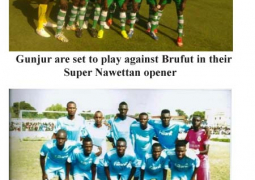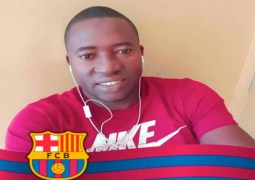The cocaine trial involving Jonathan Okoye, a Nigerian national, resumed last Thursday at the narcotics court of the Banjul Magistrates' Court with the defence counsel L.K. Mboge applying to the court to order a voire dire or trial within a trial.
According to lawyer Mboge, his client was under the custody of the anti narcotics officials when his statement was obtained.
The National Drug Enforcement Agency (NDEA) prosecuting officer, Reymond Jarju, earlier applied to tender both the cautionary and voluntary statements of the accused as exhibits.
Testifying, the first prosecution witness, Sheriffo Kujabi, told the court that he obtained both the cautionary and voluntary statements from the accused person on 19th October 2009.
He said the statements were obtained at the NDEA charge office at Serrekunda Police Station in the presence of an independent witness, one Ebrima Jagne, of Dippa Kunda.
The narcotics officer further told the court that on 13th January 2010, he also obtained another cautionary and voluntary statement from the accused.
At this juncture, lawyer L.K. Mboge applied for an adjournment on the grounds that the said documents were not served to the defence, and that he would not be able to cross-examine the witness on them.
"I need privacy with my client to consult him on this statement so that he can tell me how this statement was obtained either voluntarily or not," counsel Mboge added.
"The contents of the document should be known to the defence, whether it is a confessional statement or not," L.K. Mboge further submitted.
He said he was objecting to the tendering of the said statement because they are confessional in nature, as he put it: "As I am speaking, I don't know whether there was any independent witness present."
Mboge added that the statements were not voluntarily made contrary to the claimed made by the witness, this is because at the time this statements were obtained from the accused, he was in the custody of the anti narcotics officers.
He said the prosecution did not meet the requirement of section 33 of the Evidence Act of 1994 and, therefore, asked the court to order for a voire dire because the statement was not voluntarily made.
In response, prosecuting officer Jarju submitted that the objection of the defence counsel lacks merit, stating that it is not mandatory on the prosecution to make such documents available to the defence.
He said the section cited by the counsel with regards to admissibility was null and void. He argued that there was an independent witness when the accused person’s statement was obtained, and referred the court to section 37 and 76 of the Evidence Act to further strengthen his submission.
Jarju also cited section 82 of the Drug Control Act, which he said was for the purpose of relevance, and urged the court to admit the said statements.
However, he later applied before the court for his earlier submission to be expunged, and further applied for an adjournment in order to reply to defence counsel’s submission.
Defence counsel Mboge then rose and said he was opposing the application to expunge the prosecution’s submission on the grounds that he has responded fully to his submissions.
"Your worship it would be unfair at this stage to expunge the submissions of the prosecution because he responded fully to my objection, and I urged your worship to overrule his objection and allow me to reply on point of law," counsel submitted.
Magistrate Abeke in his ruling refused the prosecution’s application to expunge his submission, and also for an adjournment, and ordered the defence counsel to reply on points of law.
Replying on points of law, counsel Mboge cited section 37 of the Evidence Act, which according to him does not apply in this case. He said section 76 which the prosecution referred to does not also apply because it referred to admissibility by an accused person who wrote the statement by himself or by his counsel.
Mboge told the court that section 82 of the Drug Control Act referred to by the prosecutor is subject to the proceedings laid down in the Evidence Act, noting that as much as the statement are relevant under section 3 of the Evidence Act and section 33 serves as a filter and separates chaff from the seeds.
The case was adjourned to Tuesday 7th September 2010 for ruling.
Mr. Okoye was indicted by anti narcotics prosecutors on three counts of possession of prohibited drugs, possession of prohibited drugs for the purpose of trafficking.
Prosecutors claimed that Okoye was found in possession of one gram of cocaine on 19th October 2009 at Bundung, and another 47g, 210mg of heroine on 13th January 2010. He was also alleged to have been found in possession of 440mg of cocaine. He denied all the charges.




